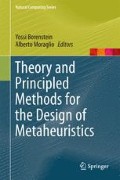Abstract
The aim of this chapter is to draw links between (1) No Free Lunch (NFL) theorems which, interpreted inversely, lay the foundation of how to design search heuristics that exploit prior knowledge about the function, (2) partially observable Markov decision processes (POMDP) and their approach to the problem of sequentially and optimally choosing search points, and (3) the use of Gaussian processes as a representation of belief, i.e., knowledge about the problem. On the one hand, this joint discussion of NFL, POMDPs and Gaussian processes will give a broader view on the problem of search heuristics. On the other hand this will naturally introduce us to efficient global optimization algorithms that are well known in operations research and geology (Gutmann, J Glob Optim 19:201–227, 2001; Jones et al., J Glob Optim 13:455–492, 1998; Jones, J Glob Optim 21:345–383, 2001) and which, in our view, naturally arise from a discussion of NFL and POMDPs.
Access this chapter
Tax calculation will be finalised at checkout
Purchases are for personal use only
Notes
- 1.
- 2.
On true subsets ⊂ X, but not all subsets ⊆ X. This weaker condition ensures that also the ⇐ holds; see proof for details.
- 3.
Alternatives to represent agent policies are, for instance, finite state controllers [11].
- 4.
References
A. Auger, O. Teytaud, Continuous lunches are free plus the design of optimal optimization algorithms. Algorithmica 57(1), 121–146 (2010)
H. Gutmann, A radial basis function method for global optimization. J. Glob. Optim. 19, 201–227 (2001)
N. Hansen, A. Ostermeier, Completely derandomized self-adaption in evolutionary strategies. Evol. Comput. 9, 159–195 (2001)
M. Hutter, Towards a universal theory of artificial intelligence based on algorithmic probability and sequential decision theory. arXiv: cs.AI/0012011 (2000)
C. Igel, M. Toussaint, A no-free-lunch theorem for non-uniform distributions of target functions. J. Math. Model. Algorithms 3, 313–322 (2004)
D. Jones, M. Schonlau, W. Welch, Efficient global optimization of expensive black-box functions. J. Glob. Optim. 13, 455–492 (1998)
D.R. Jones, A taxonomy of global optimization methods based on response surfaces. J. Glob. Optim. 21, 345–383 (2001)
M. Pelikan, D.E. Goldberg, F. Lobo, A survey of optimization by building and using probabilistic models. Technical Report IlliGAL-99018, Illinois Genetic Algorithms Laboratory, 1999
J. Pineau, G. Gordon, S. Thrun, Anytime point-based approximations for large POMDPs. J. Artif. Intell. Res. 27, 335–380 (2006)
J. Poland, Explicit local models: towards optimal optimization algorithms. Technical Report No. IDSIA-09-04, 2004
P. Poupart, C. Boutilier, Bounded finite state controllers, in Advances in Neural Information Processing Systems 16 (NIPS 2003), Vancouver, vol. 16 (MIT Press, 2004)
P. Poupart, N. Vlassis, J. Hoey, K. Regan, An analytic solution to discrete Bayesian reinforcement learning, in Proceeding of the 23rd International Conference on Machine Learning (ICML 2006), Pittsburgh, 2006, pp. 697–704
C.E. Rasmussen, C. Williams, Gaussian Processes for Machine Learning (MIT Press, Cambridge, 2006)
M. Toussaint, Compact representations as a search strategy: compression EDAs. Theor. Comput. Sci. 361, 57–71 (2006)
H. Ulmer, F. Streichert, A. Zell, Optimization by Gaussian processes assisted evolution strategies, in International Conference on Operations Research (OR 2003) (Springer, Heidelberg, 2003) pp. 435–442
D.H. Wolpert, W.G. Macready, No free lunch theorems for optimization. IEEE Trans. Evol. Comput. 1(1), 67–82 (1997)
Acknowledgements
This research was supported by the German Research Foundation (DFG), Emmy Noether fellowship TO 409/1-3.
Author information
Authors and Affiliations
Corresponding author
Editor information
Editors and Affiliations
Rights and permissions
Copyright information
© 2014 Springer-Verlag Berlin Heidelberg
About this chapter
Cite this chapter
Toussaint, M. (2014). The Bayesian Search Game. In: Borenstein, Y., Moraglio, A. (eds) Theory and Principled Methods for the Design of Metaheuristics. Natural Computing Series. Springer, Berlin, Heidelberg. https://doi.org/10.1007/978-3-642-33206-7_7
Download citation
DOI: https://doi.org/10.1007/978-3-642-33206-7_7
Published:
Publisher Name: Springer, Berlin, Heidelberg
Print ISBN: 978-3-642-33205-0
Online ISBN: 978-3-642-33206-7
eBook Packages: Computer ScienceComputer Science (R0)

